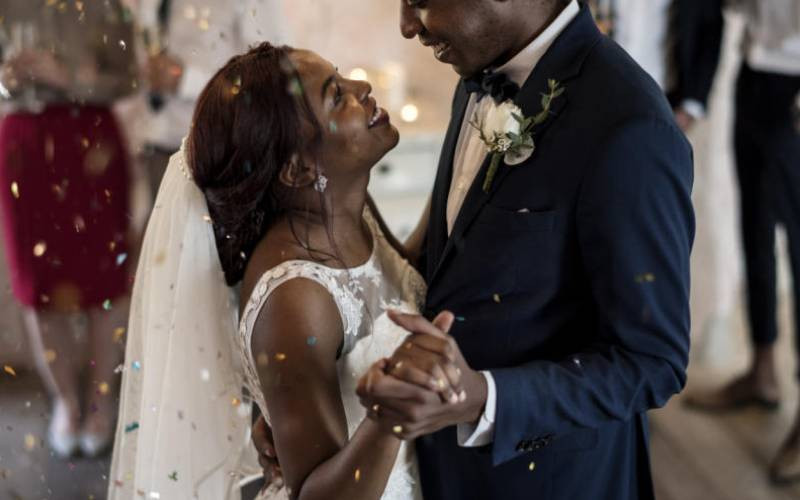
Jackie* is a news presenter in one of Kenya’s top media houses. She looks forward to marrying her long time boyfriend in what she says will be a small wedding consisting family and a few friends. She is aware that her marriage will mean making some radical changes in her lifestyle to suit her new status.
Will Jackie’s new status also mean a name change? She lets us in on her thoughts on this matter.
“At first, I was opposed to a name change just because of marriage. You see, I am in the media where your name is basically your brand. I felt I will be a different person, one that my viewers will not identify with. If I was in another career, say farming, the issue of a name change would not have come up. But I have since changed my mind about it. I will definitely take on my husband’s name,” she says.
On the other hand, Kerren*, a married woman in her early 30s says she is not going to change her name any time soon. She too has strong reasons for her decision.
“The name that everyone has known me by is simply my identity. Not changing my name to his does not in any way mean that I love him or his family less. In any case, I think the process is tedious. Let us not get into that,” says Kerren with a note of finality.
Cultural expectations
Like the two views expressed by Jackie and Kerren, to take or not to take their mates’ names is an issue that has plagued womenfolk the world over. In almost every culture however, it is expected that a woman has to legally take on her new husband’s name.
Globally, though, opinions differ on the importance of a married woman taking on her husband’s name.
In 2014, BBC published a survey that stated that the proportion of women taking on their husband’s names had shrunk considerably in the “last two decades, especially among highly educated and younger women.”
According to the report, some reasons why some women are reluctant to change their names are that the move will impact negatively on their high flying careers and the family’s standing in society.
“Some feminists point out that women suffer serious detriment to their careers when they change their names - that they signal their submission to their husbands, and reinforce to their own children the idea that women are inferior to men,” it stated.
However, this reasoning does not hold water for some women who say changing the name only fortifies the new status they have committed themselves to, that is changing their status from single women to married.
Jackie, the media personality mentioned earlier, says such “career women” who say they cannot change their names are the same ones who trivialize marriage. According to her, the current trend of hyphenating the additional name is a half-hearted measure of acquiring a new identity “since it is also easier to drop when the need arises.”
“Think of it this way. I have already given my entire being to this man, my whole life. I must be committed to the new me and that includes adopting my new family name. In any case, are we not told during the wedding that the two shall become one?” she states.
Personal brand
In Kenya, several women in the media have chosen to be recognised by their husbands’ names. Julie Gichuru and Beatrice Marshal are two well known media personalities who chose to drop their fathers’ names. According to observers, the move has not diminished their personal brands in the industry.
In America, the issue of name change after marriage elicited a heated debate in 1855 when Lucy Stone got married to Henry Blackwell. She outrightly refused to change her name eliciting a lot of negative comments from men who even denied her the right to buy property. Back then, no law existed in America requiring women to change their names after marriage.
In 1921, the Lucy Stone League was started to support women’s right to keep their maiden names. On the other hand, some states enacted laws to counter the movement labeling those women who went against it as “sick and confused” and that they needed, not a name change “but a competent psychiatrist.” Successive cases in America have removed such stereotypes affirming that women have a free choice in what they wished to do with their names.
Legal status
Rose Mbanya, a legal practitioner who specializes in family law says there is no law in Kenya requiring women to change their names after marriage. According to her, to change or not to change depends on any family discussions a couple might have.
According to the Marriage Act 2014, all parties to a marriage have the same legal status, rights and obligations at the “time of marriage, during the marriage and at the dissolution of marriage.”
“The Constitution only says that any person is entitled to a name. Changing a maiden name is influenced by social dictates. Like many countries in the world, Kenya is a patriarchal society where some cultural whims can be very strong,” says Mbanya.
For a married woman, she says, the main “identifying mark” is the marriage certificate recognised by the law. The names on the marriage certificate correspond to those on respective identification documents held by either party.
If you have to change your name
Women who want to change their names have to do so at the offices of the Registrar of Persons where a new identity card is issued after presenting the marriage certificate.
Basically, the procedure is no different than that of acquiring an identity card. However, the husband will have to be present to reaffirm his wife’s resolution. Thereafter, a new identity card will be issued to the woman bearing the new details.
 The Standard Group Plc is a multi-media organization with investments in media platforms spanning newspaper print
operations, television, radio broadcasting, digital and online services. The Standard Group is recognized as a
leading multi-media house in Kenya with a key influence in matters of national and international interest.
The Standard Group Plc is a multi-media organization with investments in media platforms spanning newspaper print
operations, television, radio broadcasting, digital and online services. The Standard Group is recognized as a
leading multi-media house in Kenya with a key influence in matters of national and international interest.



